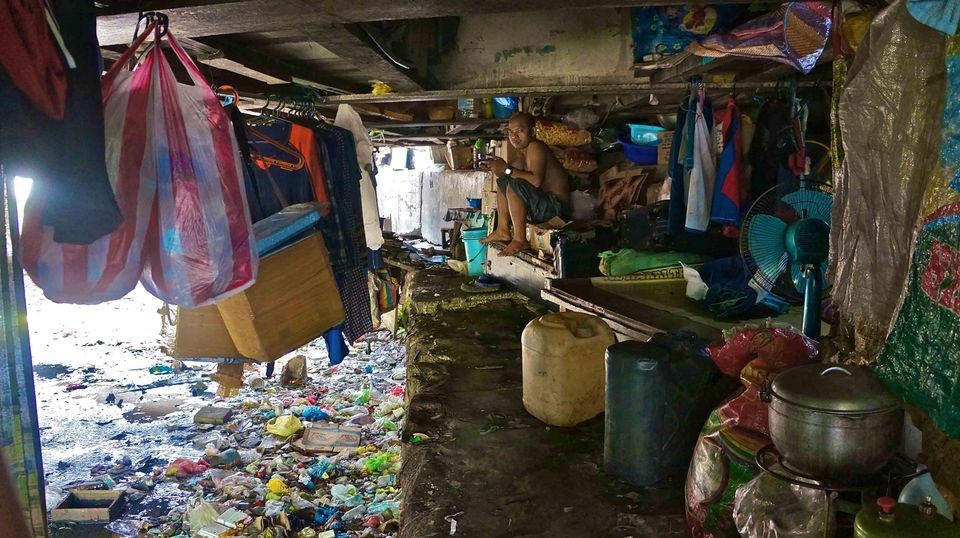
IT IS EVENING UNDER THE BRIDGE
Gospel Reflection: Luke 24: 13-35
“Stay home with us for it is nearly evening and the day is almost over.”
The two apostles who walked to Emmaus felt it was evening in their lives. Darkness sits in; their hopes gone; their dreams vanished. It felt like night.
In the past weeks during the COVID-19 lock down, I accompanied our Vincent Helps Team to distribute hot meals every other day to street people, families living under bridges, stranded construction workers, "mangangalakal", and many others who cannot respond to the command to “stay at home”. Because there is no such home to go to.
To give the food, we visit them in their hovels under the bridge. When you enter their places of abode, it is dark. The stench of the river beside their “beds” meets you head on. No electricity. No ventilation. No nothing. It truly feels like “night”.
But even before COVID-19, it was already night. Teresa and Anna – not their real names – came from Mindanao. Teresa was born in Zamboanga, got married at an early age, had one child, was separated, left for Manila and worked on the streets. Anna, now in her 60s, is single. Her parents died early. She now lives alone. They have become friends since then.
Johnny, another old man who suffers from a wound on his leg, also from Mindanao, goes around to pick up garbage and look for food for all of them. Then there are two other young men who speak Cebuano. They come and go; their companions do not know where to. And when they come back, they are welcome to stay with them under the bridge.
On the other side of the road, there is a sick old man who has a colostomy bag and suffers from ulcer. He hardly eats. He has a relative in Paranaque. He was once brought home at the beginning of the quarantine. But the residents of the village where his relatives live did not accept him. They were afraid he is COVID-positive. Fred – a middle aged man and not his relative – takes care of him. And when it is hot under the bridge as it usually is in the night, he brings him up to the side of the road under the trees.
Before the lockdown, they go around to gather garbage and earn 200 – 300 pesos each day. But now when the junkshops are closed, they go begging and are at the mercy of people who bring them food. Then the police and barangay tanod would come, prohibit them from begging, and drive them somewhere else. So they now hide under.
They are not registered with government. No votes. No names. No faces. No identities. No address. Nobodies. Absent in their radar, the government is clueless on what to do with them during the pandemic.
It is truly night under the bridge. It has always been dark in their lives.
But these men and women, who are not blood relatives, became a “family” under the bridge. They welcome one another to occupy the other section, to stay on a cardboard nearby, to sleep at the other corner.
They take care of each other. They watch each other’s little belongings because when they leave to scavenge, other people would come and steal them. “Kaya hindi pwedeng mag-isa. Dapat yong isa magbabantay habang nangangalakal ang iyong kasama,” says Teresa. (You cannot live alone. Someone has to watch for your things while the other goes out to the streets to work.)
They came from EDSA. Business was good at NEPA Q. But they were driven from there. So they moved to a safer place. Then the others came. They also welcome them to stay.
During the lockdown, when there was nothing to eat, they banded together.
These wounded people who barely knew each other combined what they were able to collect for the day, and cook them together. For some weeks now, these hungry men and women have shared food and have eaten together to be able to save on the little they have.
In this context, to “stay home” does not mean locking ourselves inside our individual homes. It is “breaking the bread” among strangers, and creating homes among those who have no homes.
Then, today’s gospel which I read echoes these words:
“While he was with them at table, he took bread, said the blessing, broke it, and gave it to them. With that their eyes were opened and they recognized him.”
One of my former professors commented on this verse during my early years in theology.
How did the disciples knew it was Jesus? He said that when Jesus opened his hands to break and share the bread among them, they saw the wounds in his hands. And then they recognized it was really Jesus.
Only with wounded hands which learns how to share once more can Jesus live again.
Only through broken lives which knows how to welcome and serve each other again shall Jesus resurrect among us.
This time, under the bridge.
Daniel Franklin E. Pilario, C.M.
St Vincent SchoolofTheology - Adamson University
danielfranklinpilario@yahoo.com
04.26.2020
Photo Credits: https://www.gmanetwork.com/news/publicaffairs/gma7specials/551711/in-photos-filipinos-living-under-a-bridge-talk-about-what-they-want-from-the-country-s-leaders/story/


